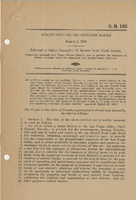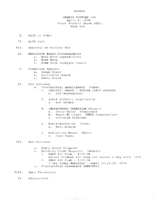Search the Special Collections and Archives Portal
Search Results
Dunes Hotel and Casino Records
Identifier
Abstract
The Dunes Hotel and Casino Records are comprised of administrative, publicity, and entertainment materials documenting the history of the Dunes Hotel and Casino in Las Vegas, Nevada from the years 1954 to 1992. Included are correspondence, contracts, photographs, hotel budgets, and an early aerial photograph of the property. The material provides a significant amount of historical documentation of the hotel that was long known to tourists and residents as the "the Miracle in the Desert."
Archival Collection
Dunes Hotel Photograph Collection
Identifier
Abstract
The Dunes Hotel Photographs (1950-1993) consist of administrative, publicity and entertainment images documenting the history of the Dunes Hotel and Casino in Las Vegas, Nevada. In addition to materials focusing on day-to-day activities at the hotel (correspondence, contracts, personnel, budgets, etc.) the collection provides insight into the hotel’s entertainment and public relations activities. Although there are chronological gaps in the collection, particularly during the later years of the Dunes (1970s-1990s), it provides a significant amount of historical documentation on the famed Strip hotel that was long known to tourists and residents alike as the “the Miracle in the Desert.”
Archival Collection
Beverly Rogers Collection of Armed Services Editions
Identifier
Abstract
The Beverly Rogers Collection of Armed Services Editions includes one thousand two hundred and seventy-nine of the original paperback Armed Services Edition titles published between 1943 and 1947 used by World War II service members in the United States Army and Navy, as well as four editions from the Legacy Project published in 2003 and one from the Pocket Books Inc. series published in 1944. The original Armed Services Editions include works of fiction and non-fiction in their unabridged forms.
Archival Collection
Fort Mojave Indian School Records
Identifier
Abstract
The Fort Mojave Indian School Records (1890-1923) consist of correspondence, finance and administrative records, pump station blueprints, and policy implementation and fact finding records. The school served the Hualapai and Mojave Indians at a site near present-day Kingman, Arizona. The information is contained in two bound volumes.
Archival Collection

Astrid Silva oral history interview: transcript
Date
Archival Collection
Description
Oral history interview with Astrid Silva conducted by Monserrath Hernández and Barbara Tabach on April 22, 2019 for the Latinx Voices of Southern Nevada Oral History Project. Astrid Silva was born in Gomez Palacio, Durango in 1988. She immigrated with her mother to the United States in 1992, where they were met by her father before flying to Los Angeles. She recounts her first impression of the United States and her families eventual move to Las Vegas, where she describes her time living in Las Vegas' west side and struggles she faced being an undocumented student living in Las Vegas. She describes her first meeting with Senator Harry Reid and the friendship that developed afterwards. She has spoken at the Democratic National Convention and has been vocal about her status as a Dreamer. She is currently the Executive Director for DREAM Big Nevada which was established in 2017 in order to provide aid to Nevada's immigrant families. She writes about her hopes for Dreamers and her continued work in expanding the ways that immigrant families can be helped in an always changing political climate. Subjects discussed include: DACA, Dreamers, Immigrant Rights, and Higher Education.
Text

Transcript of interview with Peggy Huber by Greg Pushard, March 14, 1981
Date
Archival Collection
Description
On March 14th, 1981, collector Greg Pushard interviewed postmaster Peggy Huber (born March 31st, 1884 in Conway, Arkansas) in her home in Las Vegas, Nevada. This interview covers Peggy’s life in Nevada and also offers an insightful overview of Nevada’s rich history. During this interview Peggy discusses life on the ranch, mining, settlement, and the local early aboveground atomic blasts.
Text

Nevada Senate Bill No. 155 by Senator Baker, March 2, 1949
Date
Archival Collection
Description
Bill introduced by Senator Baker to amend the Water District Act to allow issuance of bonds and levying taxes for district operation and maintenance.
Text

Meeting minutes for Consolidated Student Senate University of Nevada, Las Vegas, March 21, 1985
Date
Archival Collection
Description
Text

Meeting minutes for Consolidated Student Senate, University of Nevada, Las Vegas, April 4, 1978
Date
Archival Collection
Description
Text

Andre King oral history interview: transcript
Date
Archival Collection
Description
Oral history interview with Andre "Brother Dre" King conducted by Claytee D. White on July 20, 2018 for the Remembering 1 October Oral History Project. In this interview, King recalls learning judo and wrestling at an early age. After spending ten years in prison for a burglary offense, he served an additional eleven years in facilities across the state. After twenty-one years in the system, King is now a nondenominational spiritual being and once he learned about the Healing Garden for 1 October victims, he went there daily, during and immediately after the construction. King has helped many survivors and has healed himself as well, through giving love, hugs, and spiritual inspiration.
Text
